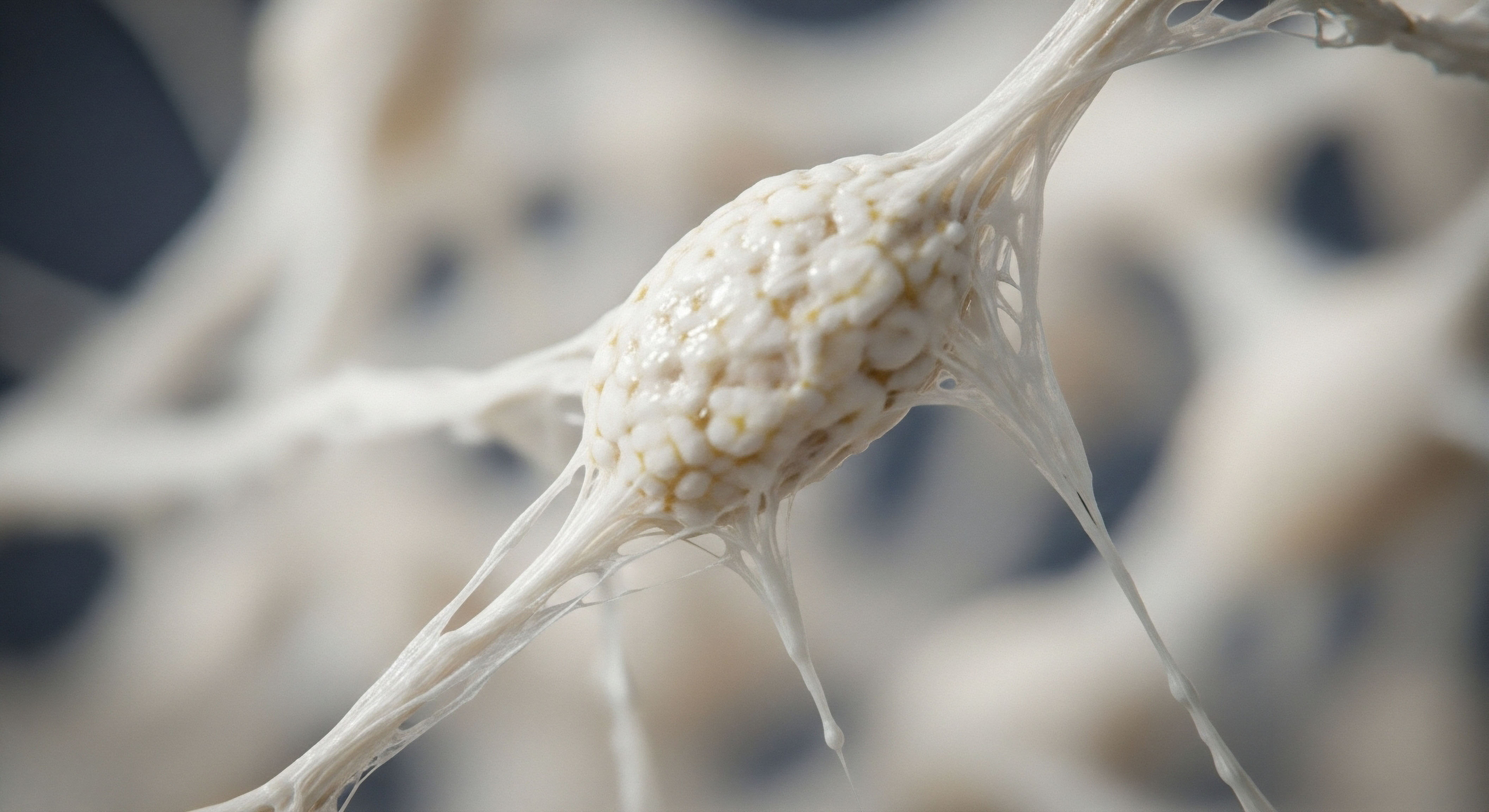

The Brain’s Intricate Signal Network
Unwavering attention, that elusive state of profound focus, arises from a meticulously orchestrated chemical symphony within the human brain. It is a biological signature, not a fleeting phenomenon. To command true cognitive presence, one must first comprehend the deep currents of neurochemistry that govern our mental landscape. This understanding begins with the core neurotransmitters, the fundamental messengers that sculpt our every thought and action.
Dopamine, often associated with reward and motivation, plays a central role in directing attentional resources. Its pathways, particularly the mesocortical and mesolimbic systems, allocate focus based on the salience of stimuli. A robust dopaminergic system allows for sustained engagement, driving the persistence required to conquer complex tasks.
Norepinephrine, released by the locus coeruleus, acts as an internal amplifier, enhancing arousal and alertness. It sharpens sensory processing, improving the signal-to-noise ratio, thereby facilitating a focused state. These two neurotransmitters work in concert, shaping our capacity for vigilance and task-specific concentration.
Approximately 6.76% of adults globally encounter challenges with focus and attention, underscoring the widespread impact of neurotransmitter imbalances.
Acetylcholine, originating from the basal forebrain and pontomesencephalic tegmental nuclei, enhances sensory processing and cortical activation. It directly supports attentional capacity, enabling the brain to manage information effectively. Glutamate and GABA, the primary excitatory and inhibitory neurotransmitters, respectively, maintain the delicate balance of neural activity. This equilibrium forms the structural foundation of attentional networks.
Serotonin, a modulator of mood and impulsivity, contributes to the balance between focused and flexible attention, preventing mental rigidity. The interplay of these chemical agents defines the quality and endurance of our cognitive output.

Hormonal Orchestration of Cognitive Resilience
Beyond the immediate neurochemical messengers, a deeper layer of control exists within the endocrine system. Hormones act as master regulators, influencing the very architecture and function of our brain. Testosterone, for instance, significantly impacts cognitive performance, particularly in areas of memory and spatial ability. Clinical studies demonstrate higher bioavailable testosterone levels correlate with superior scores on cognitive function tests, especially in aging men. Its influence extends to overall mental endurance, supporting sustained cognitive effort.
Thyroid hormones are equally critical. Triiodothyronine (TT3) levels show a direct association with cognitive performance. Imbalances, such as elevated TT3 in individuals with mild cognitive impairment, link to compromised memory, visuospatial, and executive functions. Optimal thyroid function ensures metabolic efficiency within brain cells, a prerequisite for peak attention. Cortisol, a stress hormone, also exerts profound effects. While acute, transient cortisol responses aid focus, prolonged elevation can impair learning capacity and overall brain function, undermining cognitive resilience.
These hormonal systems operate as sophisticated control loops. The hypothalamic-pituitary-gonadal (HPG) axis, for example, exemplifies a feedback system where signals between the brain and endocrine glands modulate the production of sex hormones. Understanding these interconnected systems allows for a precision approach to optimizing cognitive output. The body is a high-performance system, capable of being finely tuned for maximum cognitive potential.


Precision Tuning the Cognitive Engine
Achieving unwavering attention demands a strategic, informed approach, moving beyond generic advice to specific biological interventions. The path involves deliberate optimization of the neurochemical and hormonal landscape, a true systems-engineering project for the self. We leverage the power of advanced therapies to recalibrate internal systems, delivering new instructions to cellular architects.

Targeting Neurotransmitter Pathways
Optimizing neurotransmitter function forms the bedrock of enhanced attention. Specific compounds can selectively modulate dopamine, norepinephrine, and acetylcholine pathways. Strategies include precursors and cofactors that support neurotransmitter synthesis. For instance, L-Tyrosine serves as a precursor for dopamine and norepinephrine, while Alpha-GPC provides a bioavailable source of choline for acetylcholine production. These targeted nutritional interventions lay a robust foundation for improved signaling efficiency.
- Dopamine ∞ Essential for motivation and reward-driven attention.
- Norepinephrine ∞ Boosts alertness and signal-to-noise ratio.
- Acetylcholine ∞ Enhances sensory processing and attentional capacity.
- Serotonin ∞ Modulates mood and attention flexibility.

Hormonal Recalibration for Mental Acuity
Hormone optimization stands as a powerful lever for cognitive enhancement. For men, restoring testosterone to optimal physiological ranges can profoundly impact attention, memory, and overall mental sharpness. This involves precise therapeutic protocols, guided by comprehensive biomarker analysis. Women also benefit from balanced sex hormones, which influence a broad spectrum of brain functions. Thyroid hormone optimization, particularly maintaining ideal TT3 levels, directly supports metabolic efficiency within neural tissues, crucial for sustained focus.
Testosterone supplementation improved spatial and verbal memory in older men over a short six-week period.
Managing cortisol levels through adaptogenic compounds and strategic lifestyle adjustments mitigates the cognitive detriments of chronic stress. This protective measure shields neural pathways from inflammatory damage, preserving cognitive resilience. Hormone optimization is a foundational element in building a brain capable of sustained, high-level performance.

Peptide Signaling for Neural Enhancement
Peptides represent a frontier in neurocognitive enhancement, acting as sophisticated signaling molecules that directly influence brain function. These short amino acid chains can promote synaptic plasticity, stimulate neurogenesis, and modulate key neurotransmitter systems. Cerebrolysin, a nootropic peptide, offers neuroprotective benefits, improving brain health and cognitive function while enhancing focus and learning. Semax, derived from ACTH, boosts cognitive performance under stress and sharpens executive function. Selank modulates serotonin and dopamine, fostering mental clarity and reducing anxiety, which indirectly supports attention.
Other advanced peptides, such as Dihexa, work to improve memory and learning by enhancing synapse formation and creating new neuronal connections. These agents operate at a cellular level, delivering precise instructions that rebuild and fortify neural networks. They represent a sophisticated toolkit for those committed to a proactive strategy for cognitive longevity and peak mental output. The careful integration of these peptides offers a path to an optimized, more resilient brain.


Sustained Neurochemical Mastery
The journey toward unwavering attention unfolds over time, a commitment to consistent, informed action. Neurochemical mastery is a process, not a singular event. Understanding the timeline and the ongoing commitment involved distinguishes a transient experiment from a true lifestyle upgrade. This commitment involves diligent monitoring and responsive adjustment, mirroring the iterative nature of high-performance engineering.

Initial Foundations and Early Shifts
The initial phase of optimizing neurochemistry involves establishing foundational support. Within weeks, individuals often report subtle yet perceptible improvements in mental clarity and sustained energy. This period focuses on establishing baseline hormone levels and initiating targeted nutritional support for neurotransmitter precursors.
For example, individuals starting testosterone optimization may notice enhancements in mood and mental drive within the first few weeks, leading to improved focus on tasks. Thyroid hormone adjustments can stabilize energy and concentration relatively quickly, often within a month, once optimal dosing is achieved.
Introducing peptides such as Selank can yield more immediate benefits regarding anxiety reduction and mental calmness, creating a fertile ground for deeper focus. These early shifts represent the body’s initial response to a more intelligent, targeted chemical environment. Consistent application during this phase reinforces new neural pathways and sets the stage for more profound transformations. It marks the transition from passive acceptance to active, intentional neuro-optimization.

Long-Term Neuroplasticity and Cognitive Fortification
The true power of a neurochemical optimization strategy manifests over months and years. Sustained engagement with personalized protocols drives significant neuroplastic changes. Peptides like Cerebrolysin and Dihexa, when used consistently, support neurogenesis and synaptic strengthening, fundamentally enhancing the brain’s structural and functional integrity. This translates into a deeper capacity for sustained attention, superior memory consolidation, and improved executive function.
Regular biomarker monitoring ensures that hormonal and neurochemical levels remain within optimal ranges, adapting protocols as individual physiology evolves. This proactive maintenance prevents age-related cognitive decline and fortifies the brain against environmental stressors. The long-term perspective on neurochemical mastery yields a mind that performs with greater efficiency and resilience, a mind truly sculpted for unwavering attention. This continuous refinement builds a legacy of cognitive vitality, extending peak performance far into the future.

The Architects of Inner Focus
The pursuit of unwavering attention is a deliberate act of self-mastery, an engineering challenge for the discerning individual. It demands a scientific understanding of the brain’s chemical architecture and the courage to apply advanced, evidence-based strategies. We stand at the precipice of an era where cognitive potential is not merely accepted, but actively designed.
This journey calls for a commitment to precision, a dedication to optimizing every biological lever available. Your brain is a high-performance instrument, capable of extraordinary feats when given the right chemical key. Take command of your inner world and sculpt a future defined by clarity and unparalleled focus.



